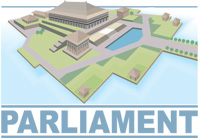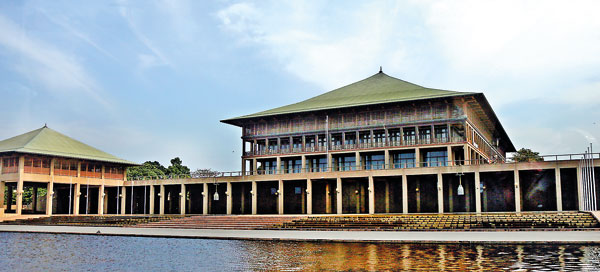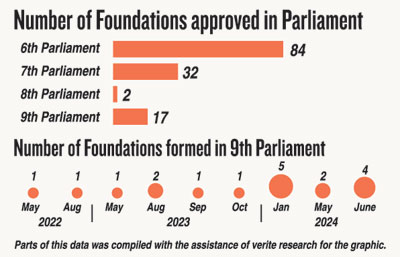Columns
Foundations of Parliamentarians operate without transparency
View(s):By Mimi Alphonsus
Many Members of Parliament, including current Cabinet Ministers, have, during their political careers, used parliamentary privileges to set up foundations, some of them untraceable.
The Sunday Times found that in this 9th parliament (September 2020 to present) 16 such foundations with political patronage and parliamentary approval had been formed without registering with a relevant authority while one had registered. Typically, charities and foundations are created by registration under the Companies Act as a company limited by guarantee and under the Voluntary Social Services Organization (Supervision and Registration) Act. Others can also be created as a trust, association or cooperative, but these too require registration with some body be it the land registry or commissioner of cooperatives. 
However, through parliamentary privileges, politicians can avoid registration and supervision by creating foundations for themselves, or on behalf of others through private member “incorporation bills”. These foundations have a variety of vague objectives ranging from organising religious programmes and supporting national unity, to establishing educational institutions and providing support to the poor or elderly.
Being relatively uncontroversial and ostensibly for charitable causes, these bills are rarely objected to by other parliamentarians and often not voted on at all, according to Nevanka Jayatilleke, research manager at manthri.lk, Verité Research’s parliamentary watchdog. Thus they can slip into existence with little oversight.
The power of incorporation bills has existed for decades, but in recent years these bills have tended to include a clause explicitly binding them to the VSSO Act, thus requiring that they register with the NGO Secretariat. 
The Sunday Times found that 33 foundations incorporated in the last three parliaments (2010 to present) had such a VSSO clause yet only one, the Samadhi Community Development Foundation moved by Buddhika Pathirana, had actually registered with the NGO Secretariat as of May 31.
Sanjeeva Wimalagunaratne, the director general of the Secretariat submitted a letter to the Speaker of Parliament on June 24 asking that foundations which contain the VSSO clause register with the secretariat immediately. Standards for registering with the NGO Secretariat are high involving submission of donor and staff lists, as well as income and expense estimates.
Mr. Wimalagunaratne maintains such measures are essential to prevent terrorist financing and money laundering.
Over 100 foundations exist that don’t include a VSSO clause at all and are even more immune from scrutiny.
Among the unregistered foundations are those in the names of ministers, including the Nimal Siripala De Silva Foundation and the Mahindananda Aluthgamage Foundation. The Members of Parliament who successfully moved the largest number of Incorporation Bills in the last three parliaments were Wijeyadasa Rajapakshe, Namal Rajapaksa, and Buddhika Pathirana.

Further, the Sunday Times went through over 50 incorporation bills and found that the vast majority of them do not contain so much as an address or name of a responsible person. Officials at the Parliament’s Bills Office further confirmed that these foundations are not required to provide any information to the Secretariat of Parliament either, giving them the ability to be effectively untraceable if they so desired.
Despite the lack of a paper trail, foundations are empowered to give and receive money, purchase and sell property, invest, and operate bank accounts.
People’s Action for Free and Fair Elections (PAFFREL) director general Rohana Hettiarachchi said that he has learned of some foundations being used for political propaganda. “Some politicians, not just parliamentarians but those in local government too, start their foundation’s work only closer to the elections, giving the impression to the people that the charity is from the politician,” he said. “We are not criticising all foundations or saying they can’t have any, only that it should not be used to transfer public money or for election propaganda.”
Wijeyadasa Rajapakshe alleged that many of the older foundations are simply defunct while some collect money from abroad. “It will be better if there can be one law through which foundations are created, something like the Companies Act,” he said. “Now there are no incorporation standards.”
The government has been pushing a controversial new NGO bill that would expand the types of organisations required to register with the secretariat. Given that so many foundations clearly falling under the NGO Secretariat’s jurisdiction have evaded registration for so long, the secretariat’s enforcement capabilities — particularly when it comes to foundations with political patronage — will need to be prioritised, too.
Buying or selling electronics has never been easier with the help of Hitad.lk! We, at Hitad.lk, hear your needs and endeavour to provide you with the perfect listings of electronics; because we have listings for nearly anything! Search for your favourite electronic items for sale on Hitad.lk today!


Leave a Reply
Post Comment